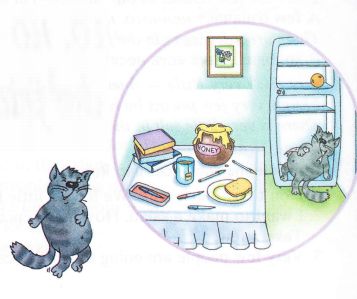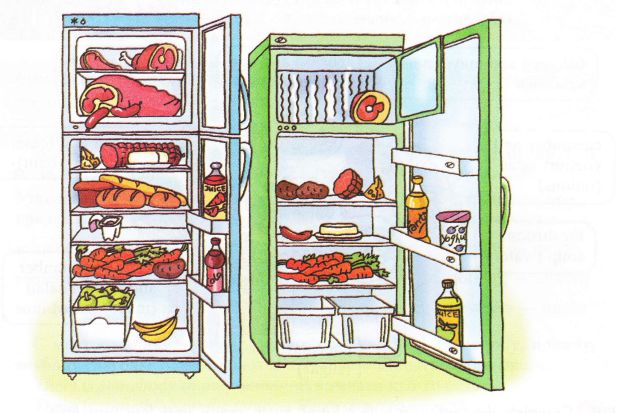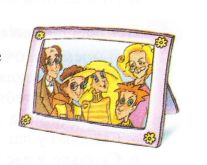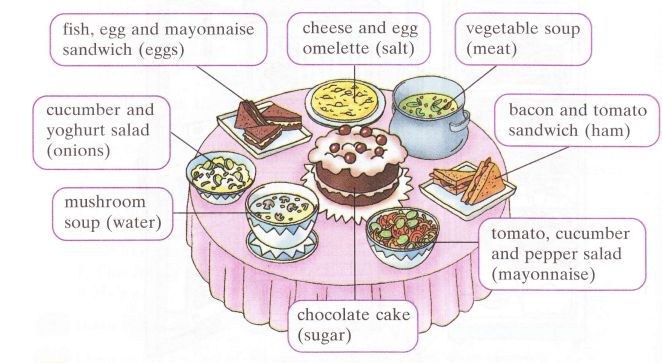|
Гипермаркет знаний>>Английский язык>>Английский язык 6 класс>> He has а fеw friеnds

1 Listen to the words, repeat them after the speaker and then read them.
few, new, drew, crew, blew, knew
Буквосочетание ew в конце слова передает звук [ju:].
|
Местоимения few, little
Местоимения few, little обозначают небольшое количество (мало).
Little употребляется с неисчисляемыми существительными.
There is little snow this winter. — Этой зимой мало снега.
A little означает немного, но достаточно.
I have a little time. I can help you. — У меня есть немного времени. Я могу вам помочь.
Few употребляется с исчисляемыми существительными.
There are few houses in our street. — На нашей улице мало домов.
A few означает немного, но достаточно; несколько.
There are a few eggs in the fridge. She can make a cake. —
В холодильнике есть несколько яиц. Она может испечь торт.
very few / very little — очень мало
I know very few poems by heart. — Я знаю наизусть очень мало стихов.
There is very little salt in this soup. — В этом супе очень мало соли.
2 Translate the sentences into Russian.
1. Don't buy much milk. We have a little in the fridge.
2. I want to make a salad. How many cucumbers do I need? — Take a few.
3. Very few people are going to eat this cake. It's very sweet.
4. Your pizza is very nice, but there is very little salt in it.
5. I can't go out now. I have very little time before my Mum comes home.
6. I need a little milk. Do you have any?
7. He is not a famous writer. Very few people know about him.
8. I know a few teachers in your school.
3 Fill in the gaps. Use very few or very little.
1. We have ... butter.
2. There are ... animals in the zoo.
3. There are ... hotels in this town.
4. We have ... juice.
5. This winter is not very cold. There is ... snow.
4 Fill in the gaps. Use very little / very few, a little / a few and the words: hobbies, meat, rain, buses, ham, friends, people, eggs.
1. We can't make ham and cheese sandwiches. We have a lot of cheese, but.
2. You have a lot of milk. Why don't you make an omelette? We have...
3. Why are the farmers sad this summer? There is...
4. I'm not a vegetarian. I eat...
5. My grandfather is never alone. He has...
6. I'll have to go home now. There are... at night.
7. This film is boring. ... like it.
8. He's a very interesting man. He has...
5 Listen to the dialogue and write a shopping list for Kate.
 Listen to the ending of the conversion and check your answers. Listen to the ending of the conversion and check your answers.
6 Ask questions with How much or How many and give short answers.
Model:There are very few people in the streets at 11 p.m. —
How many people are there in the streets at 11 p.m.?— Very few.
1. There is very little bread on the table.
2. There is a lot of honey in the jar.
3. There are very few oranges in the fridge.
4. There isn't any coffee in the mug.
5. There are very few pens in the box.

7 Find ten differences between these two fridges. Найдите десять различий между содержимым этих двух холодильников.
Use: much, many, few, little, very few, very little, there is no, there isn't / aren't any, some.
Model:There is a lot of meat in the blue fridge, but there is very little meat in the green fridge.

8 Read the text and choose the correct answers.
Betsey and James MacWizards have three children: Rosy, Mark and Rob.
Normally, Betsey has a lot of problems with family dinners, because each member of the family has his or her favourite food. Rosy and Mark eat rice and ham. Rob and Rosy like bread and cheese. Rob and Mr MacWizard like chicken and bread.

1. Which food doesn't Rosy eat? a) bread b) chicken c) ham d) rice e) cheese
2. Who eats cheese, chicken and bread? a) Rosy b) Rob c) Mark d) Mr MacWizard
3. Who doesn't eat cheese, but eats ham and rice? a) Rosy b) Rob c) Mark d) Mr MacWizard Unit 6 Lesson/ 129
4. Which food is OK for most of the family? a) bread b) ham c) rice d) chicken e) cheese
Homework
A Write two questions about each dish and answer them. Use the words in brackets in your questions.
Model:Is there any salt in this omelette? — Yes, there is. What is there in this
omelette? There are a lot of eggs, a lot of cheese, some milk, some
salt and some butter.

В Complete the sentences with a lot of, much, many, very few, very little.
1. We have ... lemons. I have to go to the shop.
2. She has ... friends. She is a very nice girl.
3. I have ... time. I'm going to be late.
4. There is ... cola in this tin. You can drink it.
5. How ... books are you going to read this month?
6. How ... milk do you like in your coffe?
С Translate the sentences into English.
1. В моем чае очень мало сахара.
2. День рождения приносит много радости.
3. Сколько у тебя домашних любимцев?
4. Сколько мяса ты кладешь в суп?
5. Сколько у нас молока?
6. Сколько у вас времени?
К. И. Кауфман, М. Ю. Кауфман Английский язык: Счастливый английский.ру / Happy English.ru: Учебник англ. яз. для 6 кл. общеобраз. учрежд.— Обнинск: Титул, 2008.— 288 с: ил.
Учебники по всему предметам скачать, разработка планов уроков для учителей, Английский язык для 6 класса онлайн
Содержание урока
 конспект урока конспект урока
 опорный каркас опорный каркас
 презентация урока презентация урока
 акселеративные методы акселеративные методы
 интерактивные технологии
Практика интерактивные технологии
Практика
 задачи и упражнения задачи и упражнения
 самопроверка самопроверка
 практикумы, тренинги, кейсы, квесты практикумы, тренинги, кейсы, квесты
 домашние задания домашние задания
 дискуссионные вопросы дискуссионные вопросы
 риторические вопросы от учеников
Иллюстрации риторические вопросы от учеников
Иллюстрации
 аудио-, видеоклипы и мультимедиа аудио-, видеоклипы и мультимедиа
 фотографии, картинки фотографии, картинки
 графики, таблицы, схемы графики, таблицы, схемы
 юмор, анекдоты, приколы, комиксы юмор, анекдоты, приколы, комиксы
 притчи, поговорки, кроссворды, цитаты
Дополнения притчи, поговорки, кроссворды, цитаты
Дополнения
 рефераты рефераты
 статьи статьи
 фишки для любознательных фишки для любознательных
 шпаргалки шпаргалки
 учебники основные и дополнительные учебники основные и дополнительные
 словарь терминов словарь терминов
 прочие
Совершенствование учебников и уроков прочие
Совершенствование учебников и уроков
 исправление ошибок в учебнике исправление ошибок в учебнике
 обновление фрагмента в учебнике обновление фрагмента в учебнике
 элементы новаторства на уроке элементы новаторства на уроке
 замена устаревших знаний новыми
Только для учителей замена устаревших знаний новыми
Только для учителей
 идеальные уроки идеальные уроки
 календарный план на год календарный план на год
 методические рекомендации методические рекомендации
 программы программы
 обсуждения
Интегрированные уроки обсуждения
Интегрированные уроки
Если у вас есть исправления или предложения к данному уроку, напишите нам.
Если вы хотите увидеть другие корректировки и пожелания к урокам, смотрите здесь - Образовательный форум.
|














